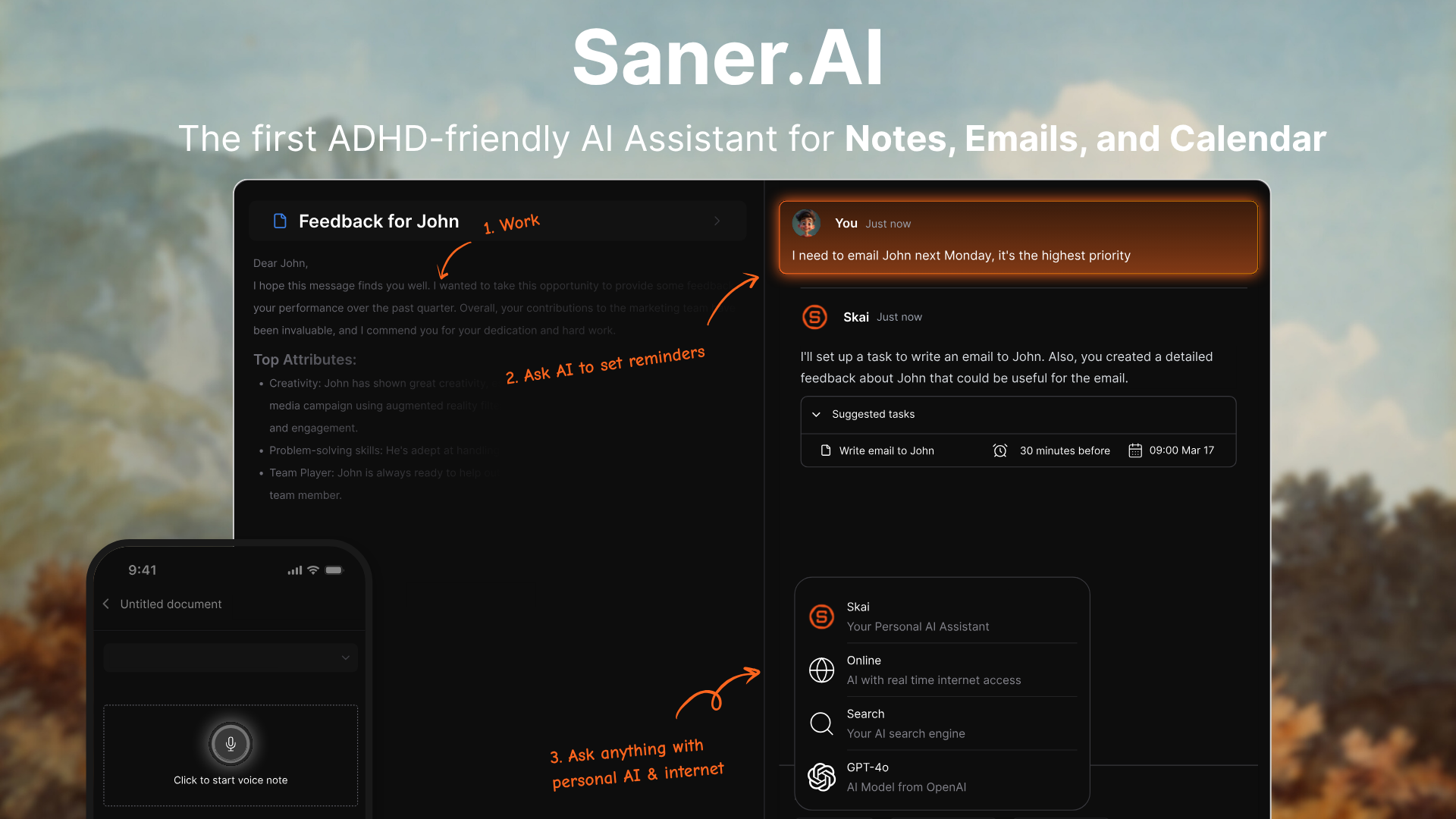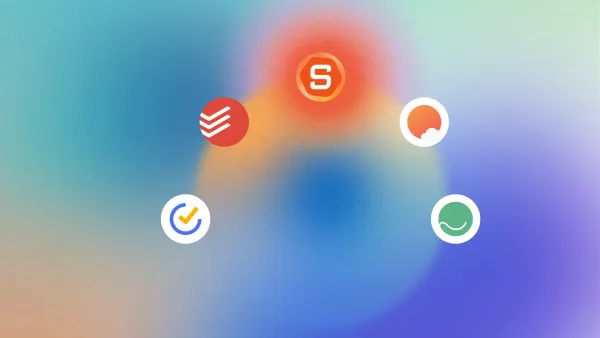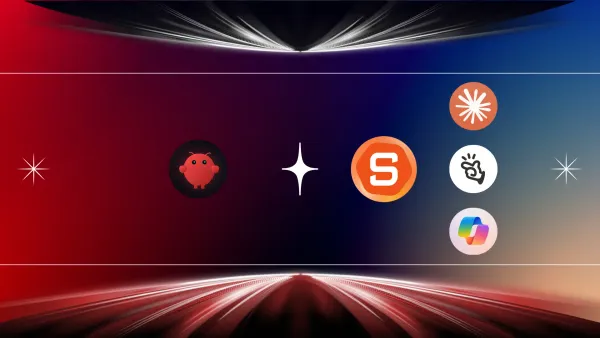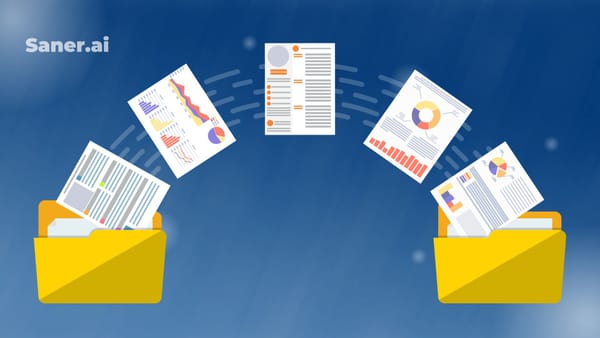AI Assistant Online: We Tested The 10 Best Apps (Free & Paid)
The Best AI Assistants Online are: Saner.AI, ChatGPT, Gemini, Claude, Grok, Copilot, Pi, Perplexity, Deepseek, and Meta
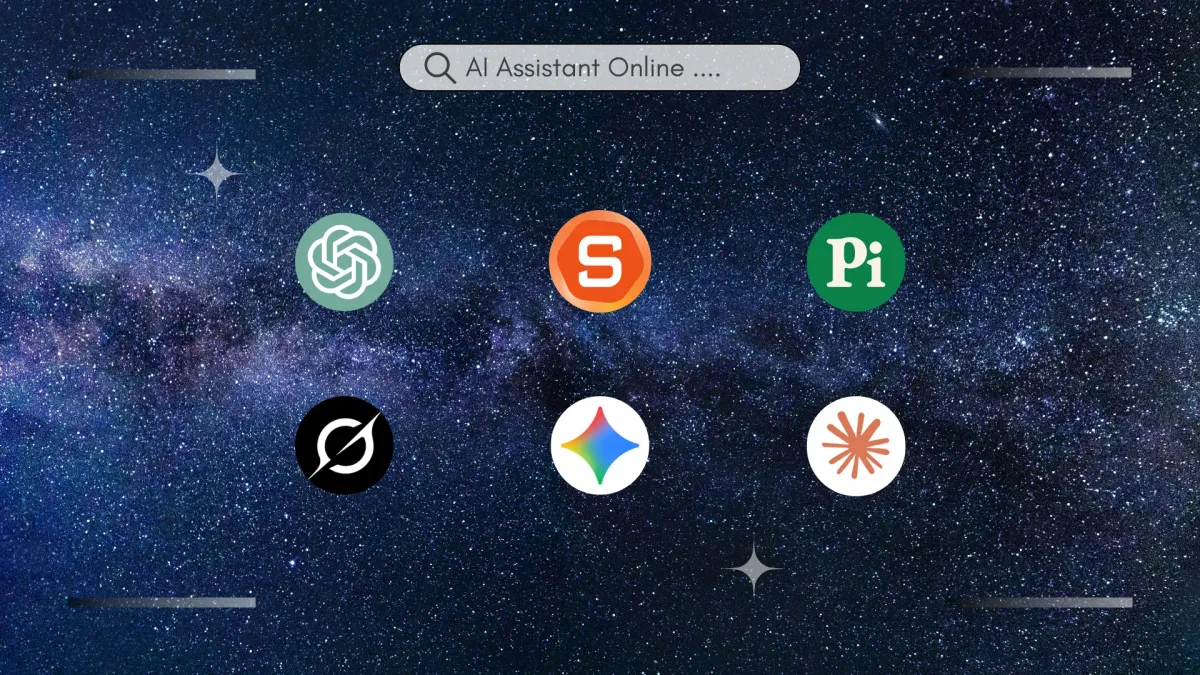
We tested the 10 Best AI Assistants Online in 2025
By 2025, it feels like everyone has launched an AI assistant.
ChatGPT. Gemini. Claude. Copilot. Saner. Pi.
Each promises to “change how you work.” But here’s the catch - most people don’t know which one actually helps in daily life.
Some are great for chatting.
Some plan your entire day.
Others just… summarize stuff.
This guide cuts through the noise and shows you the best AI assistants online, tested in real workflows - for productivity, creativity, and business growth.
What Is an Online AI Assistant?
An AI assistant is software that helps you complete tasks, find information, and automate work through natural conversation.
Unlike traditional chatbots (which just follow scripts), AI assistants:
- Understand context from your past chats or files.
- Act on commands - like scheduling a meeting or writing an email draft.
- Learn from your behavior to personalize help over time.
Think of them as your digital co-worker - available 24/7 to organize, explain, or execute.
🧠 Examples include:
- ChatGPT – reasoning & writing.
- Saner.AI – proactive planning & task execution.
- Gemini – search & Google integration.
- Claude – document comprehension.
- Copilot – Microsoft ecosystem automation.
How We Tested the Best AI Assistants Online
We didn’t just read specs - we used them for weeks in real workflows.
✅ Criteria:
- Usability: Is it intuitive for daily use?
- Accuracy: Does it give correct, useful responses?
- Integrations: Does it connect with email, notes, and calendars?
- Proactivity: Can it anticipate what you need next?
- Value: Is it worth paying for, or does free work fine?
Each tool below was tested for writing, planning, research, and real-world communication.
Let's dive in!
What Are The Best AI Assistants Online in 2025?
The Best AI Assistants Online are: Saner.AI, ChatGPT, Gemini, Claude, Grok, Copilot, Pi, Perplexity, Deepseek, and Meta
🧠 Best Online AI Assistants (2025 Comparison)
| 🤖 AI Assistant | 🌟 Key Strengths & Positioning | ⚙️ Weaknesses / Limitations | 💼 Best Use Cases |
|---|---|---|---|
| Saner.AI | Combines notes, tasks, and AI into one workspace. Designed for simplicity. | Need internet to fully function. | Managing work information, planning your day, unifying notes and tasks. |
| ChatGPT | Excellent all-rounder for writing, reasoning, coding, and brainstorming. Supports memory and custom GPTs. | May “hallucinate” facts; lacks automation beyond chat. | Ideation, research, learning, and writing support. |
| Gemini | Integrates tightly with Google Workspace and provides real-time web results. Great for research. | Over-summarizes complex ideas; less flexible for creative projects. | Students, researchers, and Google users who need live data. |
| Claude | Excels at long document analysis and safe, human-like dialogue. Handles huge context windows. | Slower updates, limited integrations, sometimes too cautious. | Lawyers, analysts, and researchers dealing with large documents. |
| Grok | Fast and witty conversational AI from xAI; excels in real-time and pop culture queries. | Narrow use cases; fewer productivity features; occasional inaccuracy. | Fun, conversational Q&A, and social media-related research. |
| Copilot | Deep integration with Microsoft 365 (Word, Excel, Outlook, Teams). Great for automation and office work. | Requires Microsoft subscription; less creative flexibility. | Enterprise users, team collaboration, and document automation. |
| Pi | Emotionally intelligent AI built for natural, supportive conversation. Feels like a chat companion. | Limited reasoning or work features; mostly personal use. | Daily motivation, casual advice, or mental clarity chats. |
| Perplexity | Search-first assistant with source citations and real-time web accuracy. | Weak in creativity and customization; minimal memory. | Research, fact-checking, and quick verified information. |
| DeepSeek | Cost-effective, strong logical reasoning, and efficient at data-heavy tasks. | Slower processing; fewer integrations or creative abilities. | STEM work, classification, or technical problem-solving. |
| Meta AI | Integrated across Facebook, Instagram, and WhatsApp; supports chat + image generation. | Privacy concerns; not business-focused; limited global access. | Social content ideas, casual chat, and personal productivity. |
1. Saner.AI - The Online Assistant
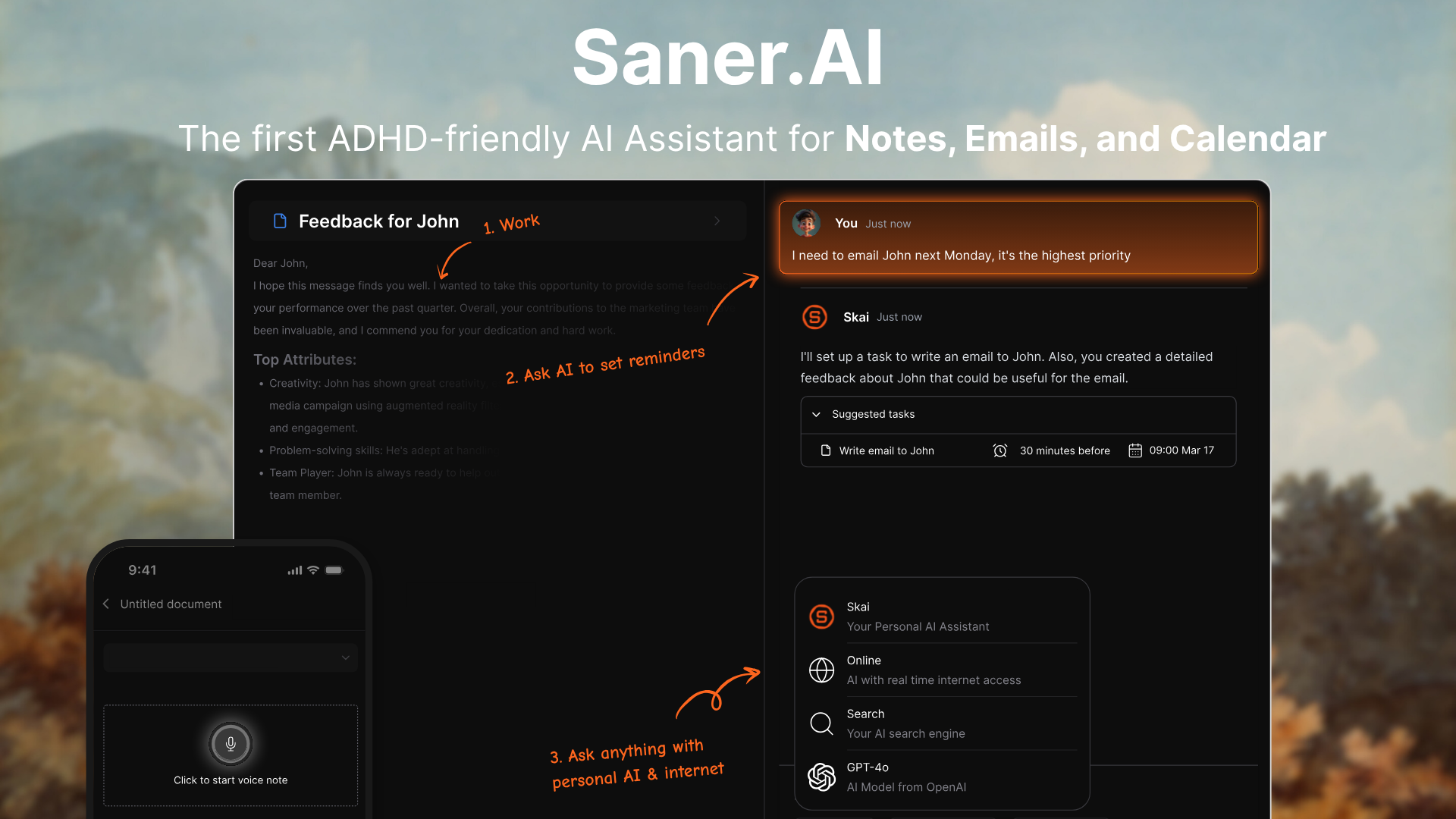
Saner.ai is an online AI assistant designed to help you manage your notes, tasks, emails, and calendar - all through natural chat. It’s built especially for people who get overwhelmed juggling multiple tools or struggle with context switching, including ADHD-prone professionals. Instead of jumping between apps, you can simply talk to Saner like a personal assistant that remembers everything for you.
Key features
- Chat-first interface – manage notes, tasks, and emails by simply talking to your AI assistant.
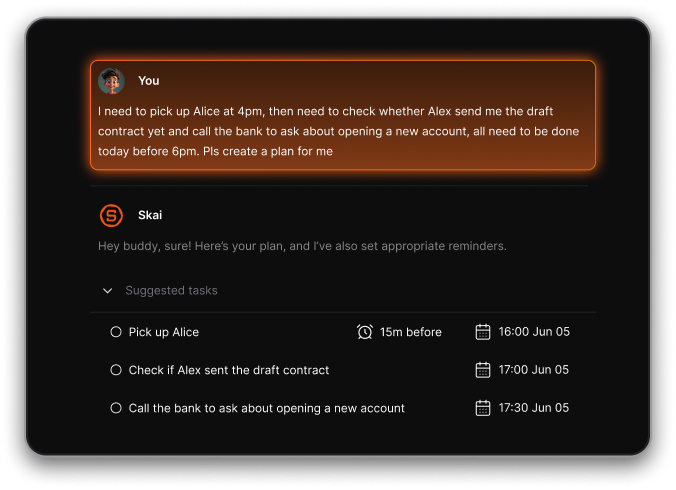
- Unified workspace – keeps tasks, emails, notes, and calendar in one place.
- Automatic Daily Planning: Get a smart morning plan with priorities, overdue tasks, and quick wins.
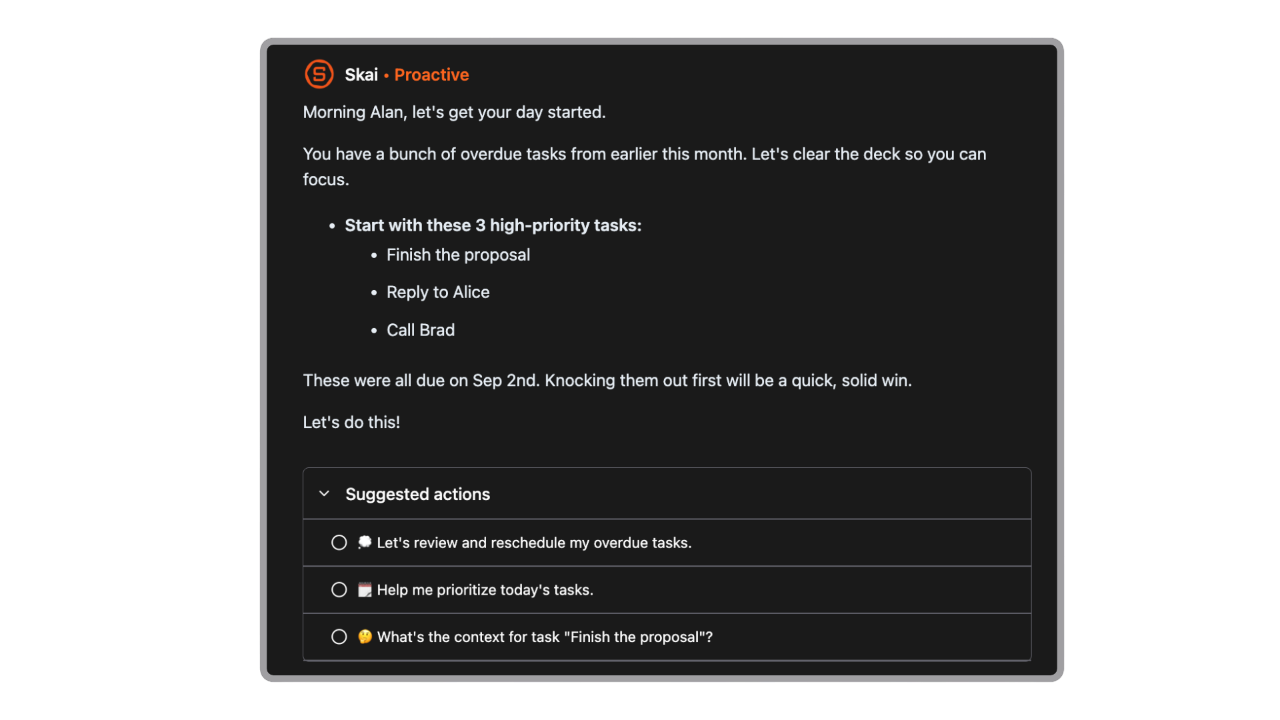
- Task Extraction: Converts thoughts, emails, and voice notes into actionable to-dos automatically.
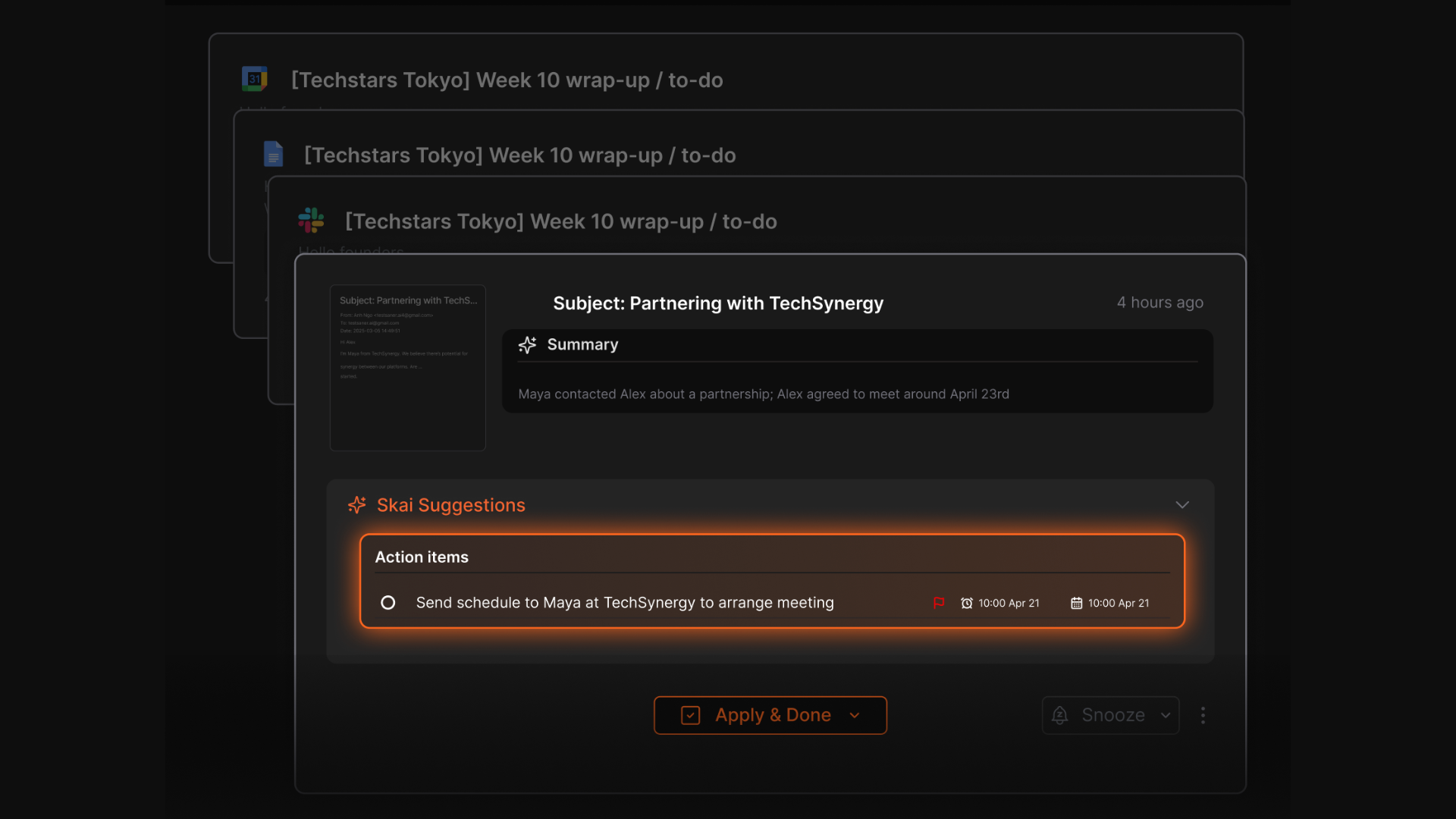
What I liked
- The conversational experience feels natural - you can literally ask it to “move yesterday’s unfinished tasks to today."
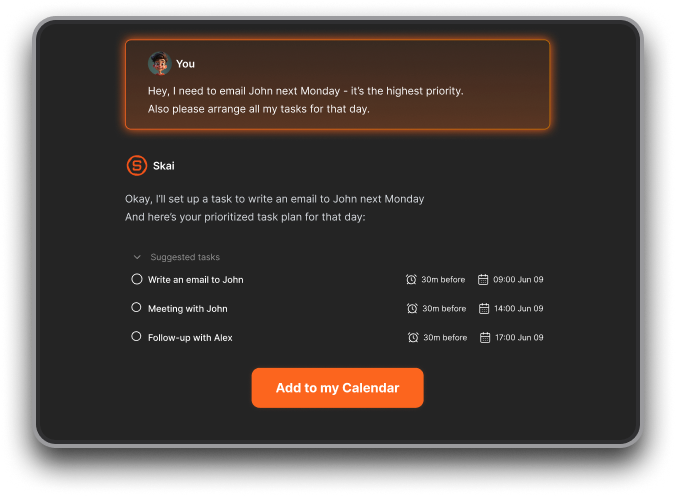
- The smart daily planner makes it easier to start the day knowing what to focus on.
- It feels genuinely built by and for people who get easily distracted

Cons
- Requires internet access for full functionality
Saner.AI Reviews

Pricing
- Free
- Starter: Monthly at $8/month, Annually at $6/month (with early user discount)
- Standard: Monthly at $16/month, Annually at $12/month (with early user discount)
Who is it suitable for?
- Entrepreneurs and professionals who want to manage everything in one place.
- ADHD-prone individuals who find traditional productivity tools overwhelming.
- Solo workers, freelancers, and small teams looking for an all-in-one AI assistant.
- Anyone who prefers natural conversation over rigid dashboards and checklists.
How to start using it?
- Sign up at saner.ai (no credit card needed).
- Connect your Google account, calendar, and email.
- Start chatting - ask it to plan your day, summarize notes, or find emails.
Work more efficient with your AI Assistant Online
2. Google Gemini

Google Gemini is Google’s flagship AI assistant that replaced Bard. It’s built to become a universal AI that works seamlessly across Gmail, Docs, Drive, Search, and Android.
Key features
- Multimodal understanding: Handles text, images, audio, and video all in one place.
- Google ecosystem integration: Works across Gmail, Docs, Drive, and Chrome to summarize emails, write documents, or find information instantly.
- Search grounding: Uses live Google Search data to fact-check and reduce hallucinations.
What I liked:
- The integration across Google apps feels seamless
- It’s great for multimodal work like summarizing PDFs, analyzing visuals, or drafting from screenshots.
- Real-time grounding with Google Search makes answers feel more trustworthy.
What I disliked:
- Performance can be inconsistent - sometimes you need to rephrase prompts to get solid results.
- The mobile experience still feels limited compared to web.
- Some of the more advanced reasoning and creative tools sit behind paid tiers.
Pricing:
- Free plan available with basic capabilities.
- Gemini Advanced (Pro) plan around $19.99/month
Suitable for:
- Professionals who live in the Google ecosystem.
- Teams using Google Workspace for collaboration.
How to start:
- Visit gemini.google and sign in with your Google account.
- Try the free version first to test writing, summarization, and image tools.
Google Gemini review (source)

3. ChatGPT

ChatGPT is OpenAI’s flagship conversational AI that can chat, reason, generate content, and now even act on your behalf. It’s evolved far beyond a simple chatbot - you can now use it to write, research, plan, analyze data, create images, and connect with tools like Gmail, Google Drive, and Slack.
Key features
- Multimodal inputs & outputs: Understands text, images, voice, and files so you can chat naturally and upload screenshots or documents for analysis.
- Advanced reasoning models: Runs on OpenAI’s latest models (GPT-5, o3-mini, o4-mini) that deliver stronger reasoning, writing, and coding performance.
- AI Agents: Execute tasks like browsing the web, filling forms, or summarizing research automatically once you give permission.
- Pulse: Sends proactive updates, insights, or summaries based on your chats and preferences.
What I liked:
- The integration with third-party apps makes it easy to take action (like booking, designing, or summarizing) in one place.
- The new agent system actually does tasks, not just talks
- Image understanding and voice chat make it feel more human and flexible.
What I disliked:
- Some of the most advanced agent features are still limited to Pro or Enterprise tiers.
- Giving permission to connectors may raise privacy and data-sharing concerns for some users.
- Deep Research has usage limits, which can restrict heavy users.
Pricing:
- Free plan: Basic chat access with limited model and features.
- Plus plan: Around $20/month with faster speed and early access to new features.
- Pro plan: Around $200/month with full access to agents, connectors, and Deep Research.
Suitable for:
- Knowledge workers, writers, and developers who want an assistant that can both think and act.
- Small teams or startups that need a shared AI workspace.
- Researchers and students who rely on credible, up-to-date information.
How to start
- Go to chat.openai.com or the ChatGPT mobile app.
- Create a free account and start exploring.
ChatGPT Reviews (source)

4. Pi.ai

Pi.ai is an empathetic AI assistant built by Inflection AI, designed to feel more like a thoughtful friend than a productivity tool. Instead of focusing on automation or analytics, Pi focuses on emotional intelligence - listening, supporting, and helping you think clearly through natural conversation. It’s ideal for anyone who wants an AI companion that feels genuinely human and easy to talk to.
Key features
- Empathetic conversations: Built to respond with warmth and emotional awareness, not robotic precision.
- Context and memory: Learns from your previous chats to personalize future responses.
- Voice interaction: You can talk with Pi using voice on desktop or mobile.
- Multi-platform: Available on web, iOS, Android, and desktop.
What I liked
- The tone feels genuinely human - it listens, empathizes, and responds thoughtfully.
- Works seamlessly across devices, so you can chat anywhere.
- No paywalls or feature locks
What I disliked
- Sometimes avoids complex or emotional topics, making conversations feel shallow.
- Memory can be inconsistent in long chats.
- Not suited for research, productivity, or task management
Pricing
- Free plan includes full text and voice chat.
Who is it suitable for
- People looking for emotional support or a reflective chat companion.
- Creatives, students, or anyone who likes to think out loud.
How to get started
- Visit pi.ai to start chatting instantly.
- You can also download the Pi mobile or desktop app for easier access.
Pi.ai reviews (source)

5. Claude

Claude is Anthropic’s flagship AI assistant built to help you think, write, and reason with clarity. It’s known for its calm tone, deep reasoning, and focus on safety through Anthropic’s “Constitutional AI.” You can use Claude for writing, summarizing long documents, coding, research, and even creative brainstorming
Key features
- Large context window (can handle hundreds of pages or long documents at once)
- Chat memory that remembers preferences and context for ongoing projects
- Multimodal input - analyze text, images, and documents directly in chat
What I liked
- It reasons step-by-step and rarely rushes answers, making explanations clear
- Can handle long documents and complex contexts better than most assistants
- Memory in Team and Enterprise plans saves time
What I disliked
- The free plan has strict limits, and Pro users still hit message caps fast
- Advanced features like memory or Artifacts are still rolling out gradually
Pricing
- Free plan available with limited daily usage
- Pro plan around $20/month for faster responses and more messages
- Max plan ($100–200/month) for high usage and early access to new features
Suitable for
- Writers, researchers, and professionals who want deep reasoning and clarity
- Developers who use it for structured code help and debugging
How to get started
- Go to claude.ai and sign up for the free version to test it out
Claude reviews (source)

6. Grok

Grok is an AI assistant developed by xAI, Elon Musk’s AI company. It’s designed to combine live internet knowledge with conversational AI, giving you real-time, witty, and often edgy responses. Unlike most assistants that rely on static data, Grok stays connected to X (formerly Twitter) and the web
Key features
- Real-time web and X integration: Keeps conversations current with live data and trending topics.
- Multimodal understanding: Accepts image uploads and can describe or analyze them.
- Voice mode: Lets you talk naturally with the assistant instead of typing.
- “Heavy” mode: Runs multiple reasoning agents in parallel for complex analysis.
What I liked
- It’s refreshingly current - you can ask about today’s events or trends, and it actually knows.
- The multimodal capability is helpful for quick visual tasks like checking design drafts or screenshots.
- The playful, humorous tone makes conversations feel more human
What I disliked
- Its “unfiltered” nature sometimes leads to controversial or biased responses.
- It can sometimes produce controversial or biased outputs since it pulls from X in real time.
Pricing
- Free access available through X, with limited features.
- X Premium ($8/month) unlocks broader Grok access.
- “Heavy” or Grok 4 plan costs around $300/month for power users.
Suitable for
- Users who care about real-time, news-aware answers.
- Creators who like a bold, witty AI voice.
How to start
- Access Grok directly via X (Twitter) or at grok.com.
- Upgrade to X Premium to unlock full assistant capabilities.
- Alternatively, visit grok.com or download the mobile app.
Grok review (source)

7. Microsoft Copilot

Microsoft Copilot is an AI assistant built directly into Microsoft 365 apps like Word, Excel, Outlook, and Teams. It helps you summarize emails, draft documents, generate insights from data, and automate repetitive tasks - all within the Microsoft tools you already use every day.
Key features
- Writing and editing: Helps draft, rewrite, or polish text inside Word, PowerPoint, and Outlook
- Excel insights: Generates formulas, explains data in plain language, and detects patterns
- App-wide integration: Works across Word, Excel, Outlook, PowerPoint, Teams, and OneNote with access to your organization’s files
What I liked
- Deeply integrated - you don’t have to leave Microsoft apps to use it
- Generates polished drafts and clear summaries that save real time
What I disliked
- Expensive for individual users or small teams
- Doesn’t work well outside the Microsoft ecosystem
- Sometimes gives inaccurate or overly confident answers
Pricing
- Copilot Pro (individuals): around $20/month
- Microsoft 365 Copilot (business): around $30/user/month
Suitable for
- Professionals and teams using Microsoft 365 daily
- Enterprises needing AI that works securely within existing apps
How to start
- Make sure you have a Microsoft 365 subscription that supports Copilot
- Add the Copilot license or upgrade to Microsoft 365 Premium
Microsoft Copilot reviews (source)

8. DeepSeek

DeepSeek is an AI assistant that’s quickly gaining attention for its strong reasoning ability and low-cost access to large language model power. Built by a Chinese startup, it aims to offer advanced chat, coding, and analytical capabilities without the heavy price tags or usage limits found in most competitors..
Key features
- Multi-mode reasoning: Offers both “thinking” and “non-thinking” modes optimized for logic, chat, and analysis.
- Long-context memory: Handles extended conversations or documents (up to 128K tokens).
- File and document understanding: Lets you upload files for analysis and summarization.
What I liked
- Very affordable, especially for API or developer use.
- Openness and flexibility - developers can self-host or customize the model.
What I disliked
- Creative or narrative writing is still weaker than top models like GPT-4 or Claude.
- Occasional server overloads or “busy” messages.
- Privacy and data-governance concerns due to China-based infrastructure.
Pricing
- 100% free right now
Suitable for
- Developers and startups looking for affordable AI APIs.
- Researchers or data analysts who value reasoning strength over writing flair.
How to start
- Visit deepseek.com or open the mobile app to create a free account.
Deepseek reviews (source)

9. Perplexity

Perplexity is an AI search assistant that gives you real-time, cited answers instead of static web links. It combines the depth of a research tool with the speed of a chatbot, helping you ask follow-up questions and explore topics conversationally.
Key features
- Conversational search that lets you ask follow-up questions in context
- Source citations with every answer for better credibility
- File upload (Pro) for analyzing PDFs, images, or research papers
What I liked
- The sourced answers make it far more trustworthy than typical AI chats
- Clean, distraction-free interface that feels intuitive from the first use
What I didn’t like
- The free version is quite limited, with only a few “Pro searches” each month
- Occasionally generates incorrect or incomplete citations on niche topics
- It doesn't have a good UI for to-do list yet
Pricing
- Free plan with limited searches and standard model access
- Pro plan around $20/month
Who it’s suitable for
- Professionals, writers, and researchers who value verified, sourced information
- Teams that want transparent AI tools for collaborative research or reporting
How to get started
- Go to perplexity.ai and create a free account
- Start by trying conversational search and follow-up questions
Perplexity reviews (source)

10. Meta.ai

Meta AI is a conversational assistant built by Meta (Facebook) that lives inside Instagram, WhatsApp, Messenger, and Facebook - and is also available on the web. It helps users ask questions, generate content, create AI images, and get quick answers without switching apps.
Key features:
- Conversational chat with memory and context awareness for more natural follow-ups
- Image and “vibe” creation using text prompts for quick visual generation
- Deep integration across Meta apps (Instagram, WhatsApp, Messenger, Facebook)
What I liked:
- Easy to access inside apps people already use daily
- Free to use with a surprisingly wide range of features
- Early integration with smart glasses shows how Meta is thinking beyond text chat
- Conversations feel smoother with basic memory and personalization

What I disliked:
- Doesn’t yet match the reasoning or accuracy of advanced assistants like ChatGPT or Claude
- Still limited in some countries and languages
- No deep productivity tools like task or calendar management
- Privacy concerns remain, given Meta’s history with data usage
Pricing:
- Free to use for now
- Meta is testing premium or advanced features for possible paid plans later in 2025
How to get started:
- Go to meta.ai or open Instagram, WhatsApp, Messenger, or Facebook
- Tap the Meta AI icon or start a new chat and type your prompt
Suitable for:
- Everyday users who want an AI assistant embedded in the apps they already use
- Creators and social media users looking for quick ideas, captions, or visuals
Meta.ai reviews (source)

🧭 Conclusion: The Right AI Assistant Can Redefine How You Work
AI assistants aren’t just chatbots anymore - they’ve become our second brains.
They remember what we forget, summarize what matters, and help us plan what’s next.
Choosing the best AI assistant online really depends on your goals:
- 🧩 Need structure and proactive help? Go with Saner.AI - it keeps your notes, tasks, and schedule in sync.
- 💬 Want the best conversational thinker? ChatGPT still leads for writing, reasoning, and creativity.
- 🔍 Research nonstop? Gemini and Perplexity shine for real-time, cited information.
- 🧾 Work inside Microsoft tools? Copilot is built for you.
- ❤️ Want something personal or emotional? Try Pi or Meta AI for a softer touch.
The key isn’t using every AI - it’s choosing one that truly fits how you think and work.
Start small. Let it assist you with daily tasks. Then, let it grow into your digital teammate.
Because the future of productivity isn’t about doing more - it’s about having an AI that helps you think saner, faster, and deeper.
✨ Your move: Explore these assistants, experiment, and find the one that feels most humanly useful.
Stay on top of your work with the top AI Chat Assistant
🧠 FAQ: Best AI Assistants Online (2025 Guide)
1. What is an AI Assistant Online?
An AI assistant online is a digital helper powered by artificial intelligence that understands natural language and helps you manage your daily life - from tasks and notes to meetings and emails.
You can chat, type, or even speak to it. Just say things like:

- “Summarize my meeting notes.”
- “Remind me to follow up with Sarah tomorrow.”
- “Find my Q3 budget spreadsheet.”
Top AI assistants online include Saner.AI, ChatGPT, Gemini, Claude, Grok, Copilot, Pi, Perplexity, Deepseek, and Meta AI - each excelling at different things like creativity, productivity, or research.
2. What can the best AI assistants online do?
They go beyond chat. These tools help you:
- ✅ Turn messy notes into tasks
- 🔍 Search across files, docs, or emails instantly
- 🗓️ Auto-plan your day or calendar
- 💬 Draft and summarize emails, reports, and meeting notes
- 🧩 Connect context between your tools (Slack, Gmail, Drive, etc.)
Saner.AI stands out for combining all of these in one calm workspace - great for busy entrepreneurs and ADHD-prone professionals.
3. Which are the best AI assistants online in 2025?
Here’s a quick view of where each shines:
| 🧩 Tool | 💡 What It’s Best For |
|---|---|
| Saner.AI | Managing notes + tasks + emails in one place |
| ChatGPT | General conversation + creative writing |
| Gemini | Google Workspace integration + research |
| Claude | Long-form reasoning + document summaries |
| Grok | Humor + X platform integration |
| Copilot | Microsoft 365 automation and emails |
| Pi | Emotional support + gentle conversation |
| Perplexity | Real-time research and citations |
| DeepSeek | Developer-focused search and data tasks |
| Meta AI | Quick Facebook and Instagram searches |
4. Are there free AI assistants online?
Yes - most have free tiers:
- Saner.AI: Free for basic AI notes + tasks + calendar sync.
- ChatGPT: Free with limited access.
- Gemini: Free inside Google Workspace.
- Meta AI: Built into Facebook + Instagram chat.
You can start free, then upgrade for deeper integrations or automation.
5. What’s the best AI assistant online for work?
If you want real-world productivity (not just chat), try Saner.AI or Copilot.
- Saner.AI combines notes, calendar, tasks, and email in one flow.
- Copilot automates Microsoft 365 workflows and emails.
Both help you act on information - not just talk about it.
6. Which AI assistant online is best for ADHD or overwhelmed users?
Saner.AI.
It turns chaotic thoughts into tasks, reminds you at the right time, and organizes everything in one calm dashboard—no complicated setups or tags. Perfect for ADHD professionals who hate switching apps.
7. Which AI assistants online are best for entrepreneurs?
Entrepreneurs love Saner.AI and Perplexity:
- Saner.AI → Turns brain dumps into actionable plans.
- Perplexity → Instant research and market insight summaries.
Together, they replace hours of searching, planning, and manual organizing.
8. Do AI assistants online actually boost productivity?
Yes - and data backs it up. They reduce mental load and context switching.
- Saner.AI surfaces the right task at the right time.
- Gemini finds and summarizes files automatically.
- ChatGPT and Claude turn rough drafts into polished copy.
Users report saving 1-3 hours a day by automating routine work.
9. Which AI assistants support voice commands?
- Saner.AI: Built-in voice-to-task.

- ChatGPT & Gemini: Voice via mobile apps.
- Pi AI: Natural voice chat experience.
Voice input makes it feel like talking to a real assistant — great for on-the-go users.
10. Which AI assistants can auto-schedule tasks or calendar events?
- Saner.AI: Understands your priorities and fills your calendar intelligently.
- Copilot: Syncs with Outlook and Teams for smart scheduling.
- Gemini: Works natively with Google Calendar.
Saner.AI’s scheduling feels more personal - it considers your workload and focus patterns.
11. How can managers use AI assistants online?
Managers can delegate digital chaos:
- Get summaries of meeting notes and emails.
- Auto-create follow-up tasks.
- Ask “What did we decide in the last team sync?” and get instant answers.
With Saner.AI or Claude, you walk into meetings prepared and leave with clarity.
12. How can executives and CEOs benefit from AI assistants?
Executives use them as a central command hub:
- Surface key decisions, notes, and OKRs in seconds.
- Stay on top of follow-ups without manual reminders.
- Delegate repetitive research or summarization to AI.
Saner.AI and Copilot are most popular at this level.
13. Can AI assistants help with meeting prep and follow-ups?
Absolutely. Tools like Saner.AI and Claude act like a meeting analyst:
Ask:
- “What were the main decisions in last week’s review?”
- “What’s still pending from the client call?”
They pull tasks and notes instantly so you walk in prepared.
14. Which AI assistant is best for research and learning?
- Perplexity → Cited, real-time answers for academic and market research.
- DeepSeek → Technical and developer-friendly insights.
- Gemini → Great for Google search context and data analysis.
These are perfect for students, researchers, and curious minds.
15. What’s the difference between an AI assistant and a traditional productivity app?
Old tools make you organize things manually.
AI assistants organize for you.
Think:
- Traditional apps = Filing cabinets.
- AI assistants = Personal chief of staff.
With Saner.AI, you just write notes naturally — it automatically:
- Tags and files them contextually.
- Reminds you what matters.
- Pulls everything together when you ask.
Your system finally thinks with you, not against you.
16. How to choose the best AI assistant for you?
Ask yourself:
- Do you want a workspace assistant (Saner.AI, Copilot)?
- A creative writer (ChatGPT, Claude)?
- A research analyst (Perplexity, DeepSeek)?
- A personal companion (Pi, Grok)?
Pick one based on how you spend your day — then test it for a week.
Stay on top of your work and life
17. What is the best AI online assistant for students?
If you want help organizing study notes and reminders, Saner.AI keeps everything in one place without distractions. It's the top picks for students
Gemini and Perplexity are also helpful.
- Gemini integrates with Google Docs and Slides for studying, research, and writing.
- Perplexity provides fast, citation-based answers for assignments and projects.
18. What is the best AI online assistant for writers and content creators?
For managing your ideas and research notes, Saner.AI adds structure behind the creativity. It's the best for writers
ChatGPT and Claude are also helpful because:
- ChatGPT helps brainstorm, outline, and edit drafts.
- Claude handles long-form content and document context beautifully.
19. What is the best AI online assistant for marketers?
ChatGPT, Claude, and Saner.AI together are a marketer’s dream.
- ChatGPT helps with copy and campaign ideas.
- Claude handles audience insights and competitor research.
- Saner.AI keeps all your assets, notes, and follow-ups connected - so nothing gets lost.
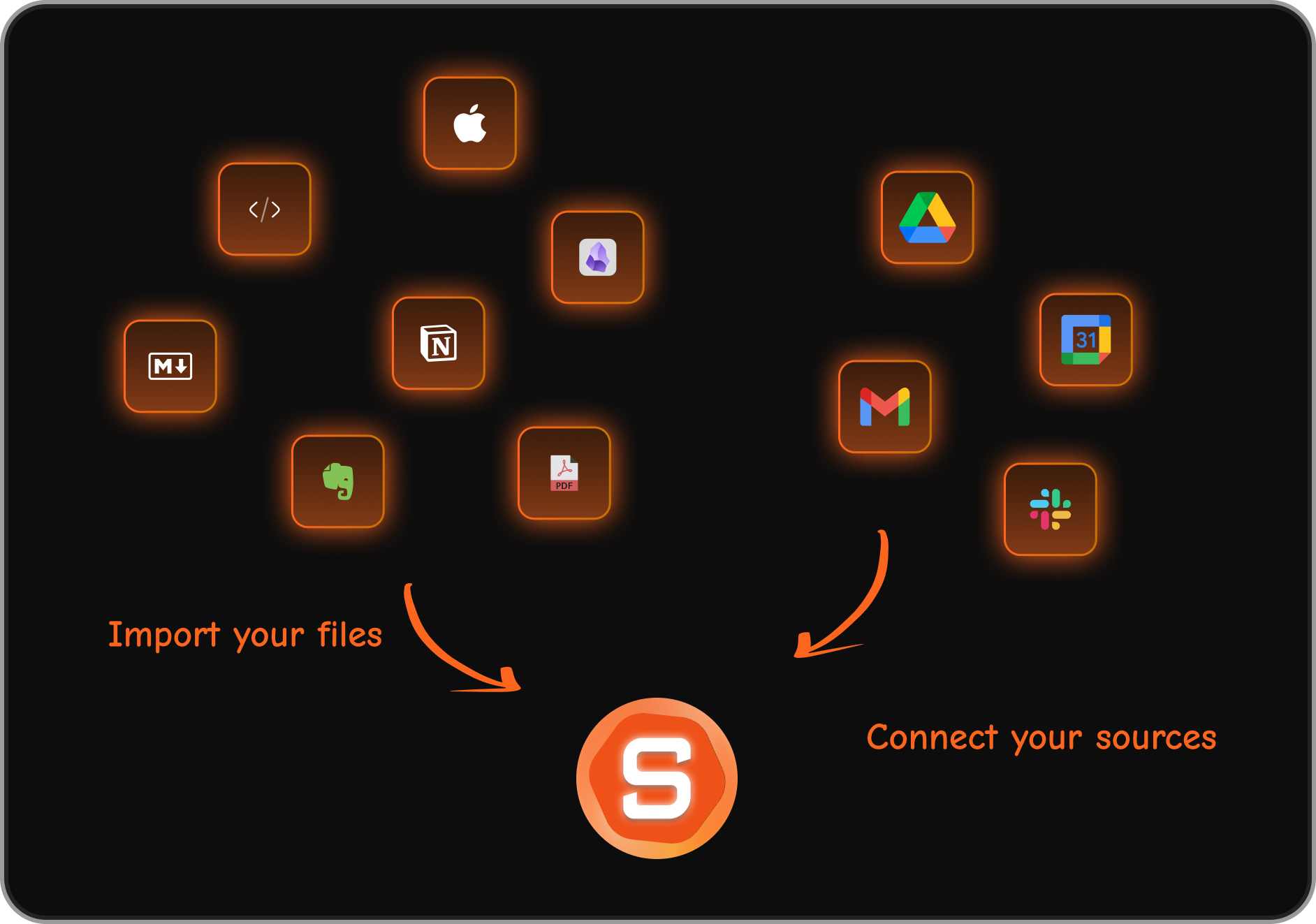
20. What is the best AI online assistant for teachers and educators?
Gemini and Saner.AI are ideal for teachers because:
- Gemini supports lesson planning, grading, and Google Classroom integration.
- Saner.AI helps educators organize materials, meeting notes, and student follow-ups.
Together, they save hours of prep and admin time.
21. What is the best AI online assistant for sales professionals?
Saner.AI and Copilot shine here.
- Saner.AI reminds you of leads, follow-ups, and meeting notes automatically.
- Copilot drafts emails and updates CRM data inside Microsoft apps.
Together, they help you close deals faster and forget fewer details.
22. What is the best AI online assistant for customer support teams?
Saner.AI can support managers by summarizing feedback and support notes.
Meta AI and ChatGPT are also helpful because:
- Meta AI integrates with Messenger and Instagram for fast responses.
- ChatGPT helps draft friendly replies or training scripts.
23. What is the best AI online assistant for freelancers and remote workers?
Saner.AI and Pi are perfect for solo professionals.
- Saner.AI keeps your clients, notes, and tasks organized without extra tools.
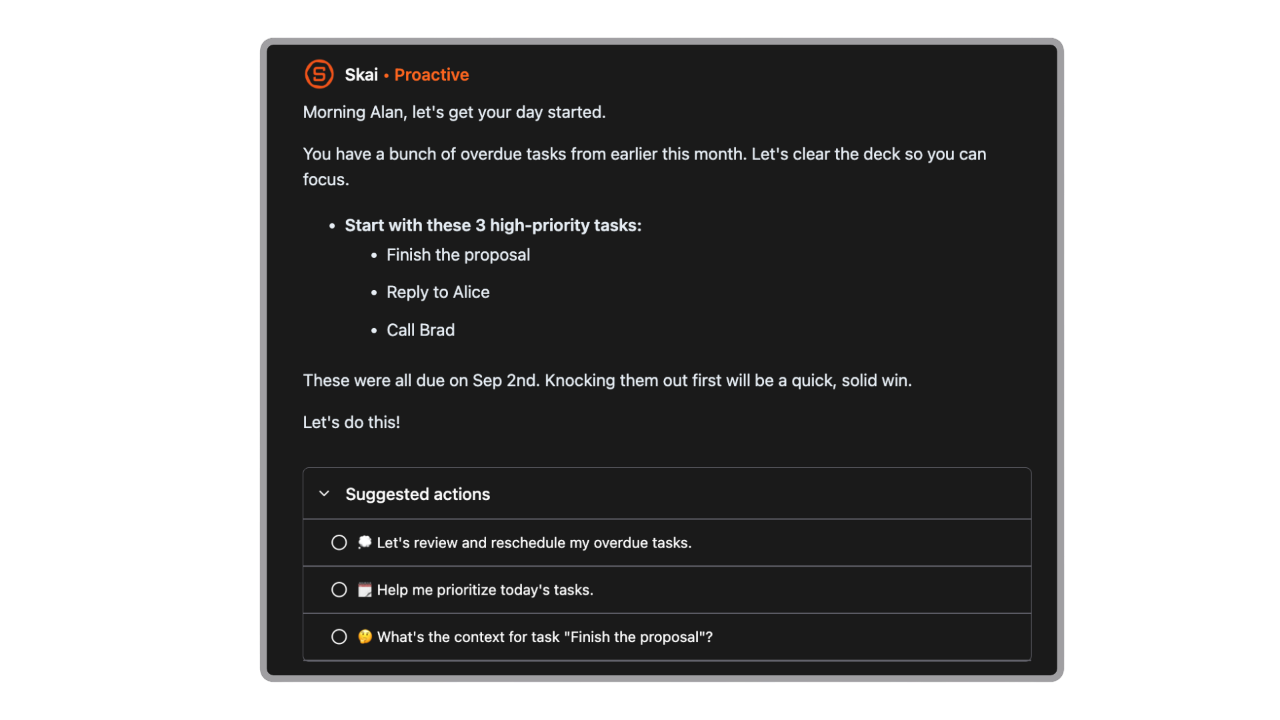
- Pi gives emotional support and gentle accountability when you work alone.
It’s like having both a project manager and a mindset coach.
24. What is the best AI online assistant for small business owners?
Saner.AI and Copilot are top choices.
- Saner.AI helps with operations, follow-ups, and task management.
- Copilot manages invoices, emails, and business reports in one place.
Both save precious time by automating small but crucial workflows.
24. What is the best AI online assistant for HR professionals or recruiters?
Claude and Saner.AI stand out.
- Claude summarizes resumes and interview notes.
- Saner.AI tracks candidate updates, follow-ups, and meeting recaps.
Together, they streamline recruiting without extra admin tools.
25. What is the best AI online assistant for busy parents?
Pi and Saner.AI are the calm combo.
- Pi helps with mental load and emotional support.
- Saner.AI remembers tasks like “book dentist appointment” or “check school forms.”
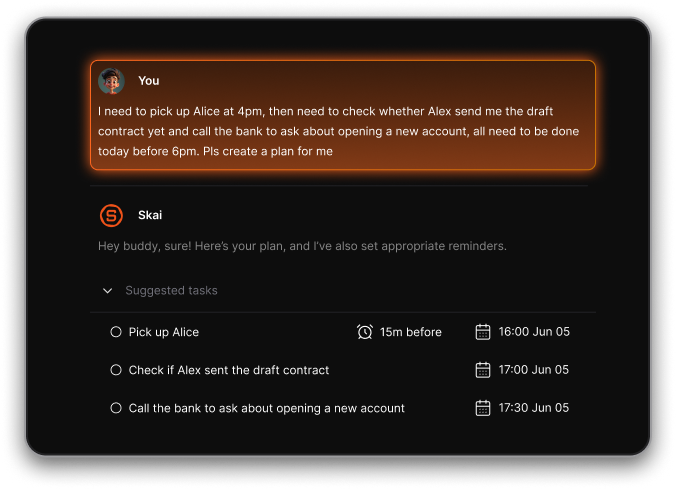
Both reduce overwhelm and keep your family life running smoothly.
Stay on top of your work and life with the top Online AI assistant

